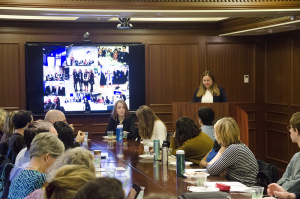
The Georgetown delegation to COP21 spoke about its experience at the conference in the Mortara Center on Feb. 1.
Members of the Georgetown delegation to the 2015 Paris Climate Conference, also known as COP21, discussed their experience and optimism for the new climate deal with the Georgetown community at an event Monday afternoon in the Mortara Center titled, “What Happened in Paris?”
The discussion was part of the Energy and Climate Policy Research Seminar, a program that encourages dialogue between students and faculty on the topics of international and domestic energy and climate change policy.
The delegation that traveled to Paris for the conference included Associate Professor of Science, Technology and International Affairs in the School of Foreign Service Joanna Lewis, Executive Director of the Georgetown Climate Center Vicki Arroyo and students Norah Berk (SFS ’15) and Alexandra Donovan (SFS ’17).
Lewis began the event by addressing the delegation and mainstream climate movement’s mixed reviews of COP21; some have deemed it a landmark achievement while others contest it will not solve climate change.
“I absolutely agree that this is not going to solve climate change but I think this is an extremely important step because we didn’t have a global platform to talk about solving climate change really until this agreement,” Lewis said.
Lewis outlined key factors that have shifted since the Kyoto Protocol was agreed upon., and making the Paris agreement possible, including the lack of country categories, groupings that exist to list countries together by their economic status and emissions targets,and the creation of targets through a bottom-up process, as opposed to a top-down process.
“Bottom-up means each country can look at their own economy and resources and they can say, ‘Well, we may not be able to cap our emissions today but I think we can accelerate a reduction, we can accelerate using renewable energy, we can slow deforestation,’” Lewis said. “So you see that these pledges that countries put forward are very nationally tailored to their circumstances, which ends up working better and getting more participation.”
Lewis attributed the negotiations’ success to the substantially evolved and improved relations between the United States and China as a result of regular meetings and bilateral discussions on climate change.
“Last November, the joint U.S.-China announcement on climate change paved the way for the targets that countries ended up agreeing on in Paris, and the language in that joint agreement ended up mobilizing a lot of the developing world and it led to a more comprehensive agreement,” Lewis said.
Arroyo said the inclusion of countries, businesses, investors, states and equivalent local people resulted in 196 countries joining together and committing to the final agreement, an improvement from past climate talks in Copenhagen in 2009 that ended with virtually no lasting progress.
“It’s not what we need to stay within the two degree Celsius [warming limit],” Arroyo said. “But for the first time you see everybody playing a role, everybody pulling together in the same direction, instead of the finger pointing that we had seen after Copenhagen.”
Arroyo attributed part of the success at COP21 to the intense role of sub-national actors, including nearly 1,000 mayors, governors and other subnational officials from around the world who took part in discussions.
“You see governors or mayors taking time out of their busy schedules, dealing with day-to-day crises, willing to come and talk about something like climate change because they are on the front lines,” Arroyo said.
Arroyo praised President Obama’s climate speech at Georgetown for providing momentum for COP21.
“He set the course for major reductions in this country … really using the full administrative authority of the White House and other agencies to support both reductions in green house gases but also to promote resilience,” Arroyo said. “It really was a turning point in my mind in terms of being able to see the kind of leadership federally which also influences international negotiations.”
Arroyo said although the Paris climate conference was a success, there is still a long road ahead.
“We arrived to 70 degree temperatures in mid-December here in D.C. and realized, ‘Wow, we need to get back to work,’” Arroyo said.
Donovan, a current Georgetown student who attended the conference while abroad in Paris, was impressed by the diversity of representatives at COP21.
“I was struck by how there were so many people there that were so passionate about the same subject. Everyone brought a unique perspective.”
Joan Abbott (SFS ’16) said it was important for students, specifically STIA majors, to attend this event and learn about the intersection of environmental policy and international relations.
“Not every STIA major is necessarily a climate person and I think it’s important that students come and hear about the current events,” Abbott said. “People are focused on the science but they don’t realize the importance of the negotiations and how delicate those situations are.”
Leyla Jiang (GRD ’17) said she was encouraged by the positive outlook the speakers had after attending COP21.
“From my experience views about climate change deals are more negative, criticizing how pragmatic this deal is but being here and listening to [the speakers’] experiences in Paris, it gives me this hope because I believe everyone who is here is very committed to this problem … it motivates you to stay in this business,” Jiang said.




















